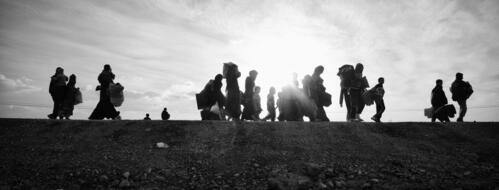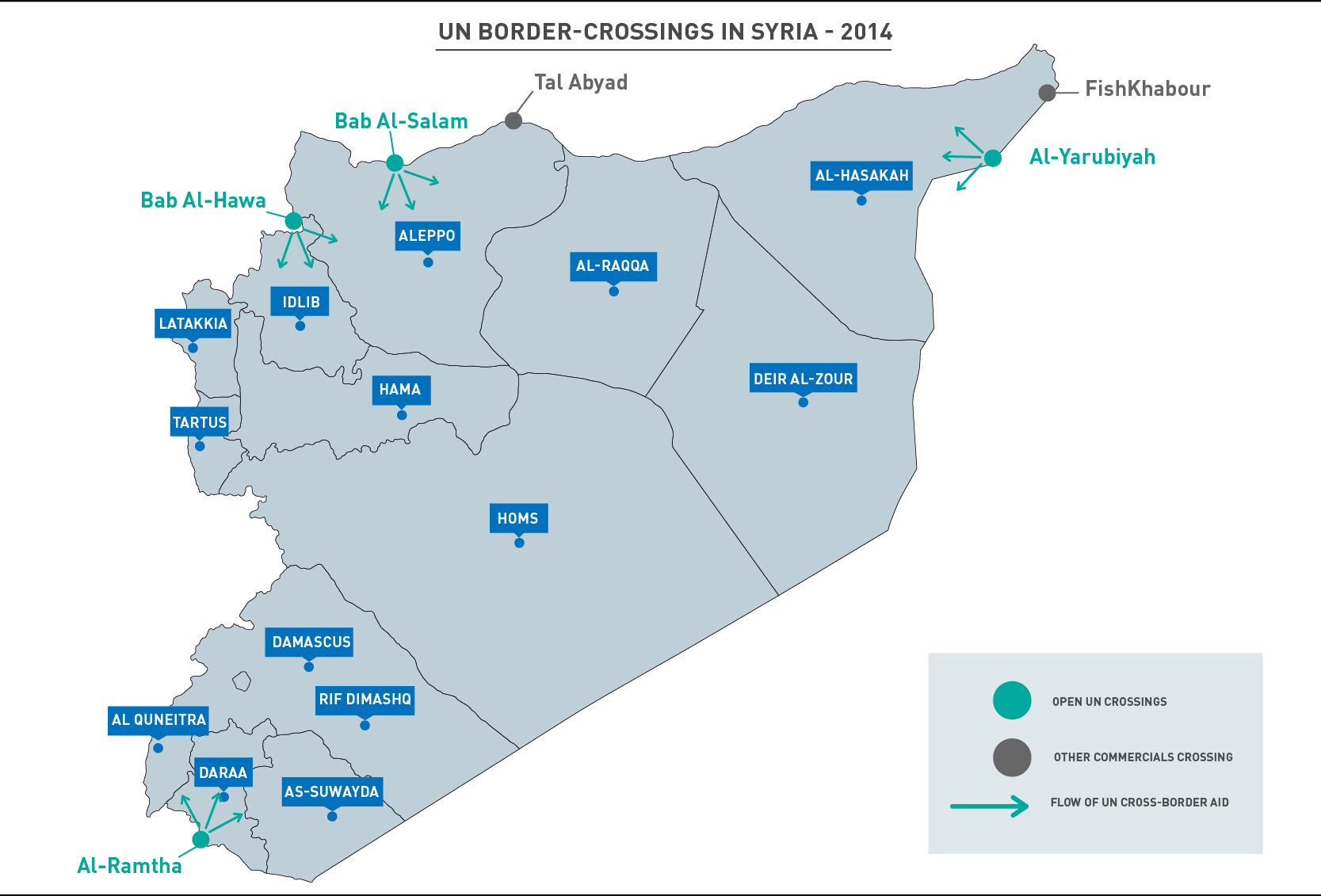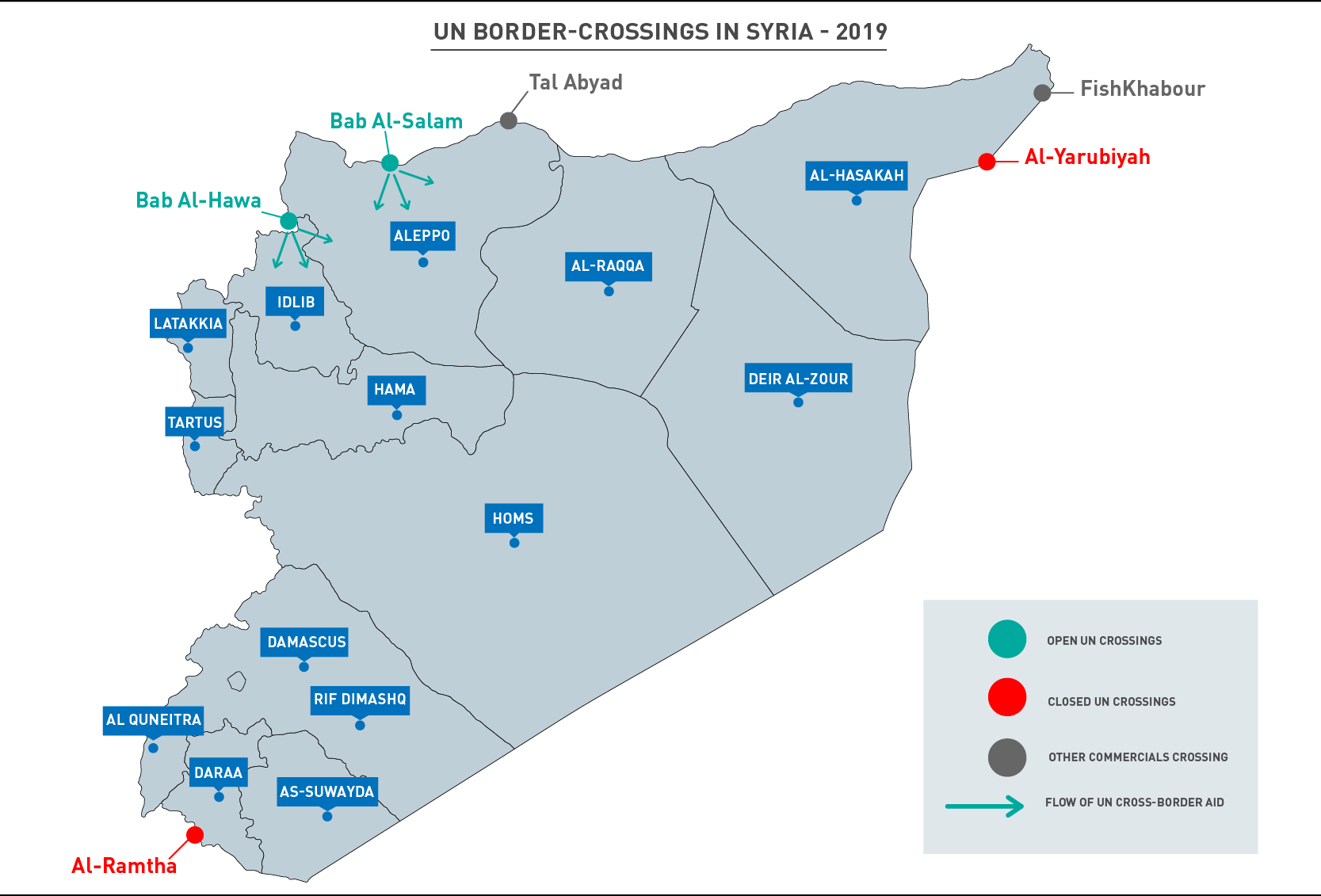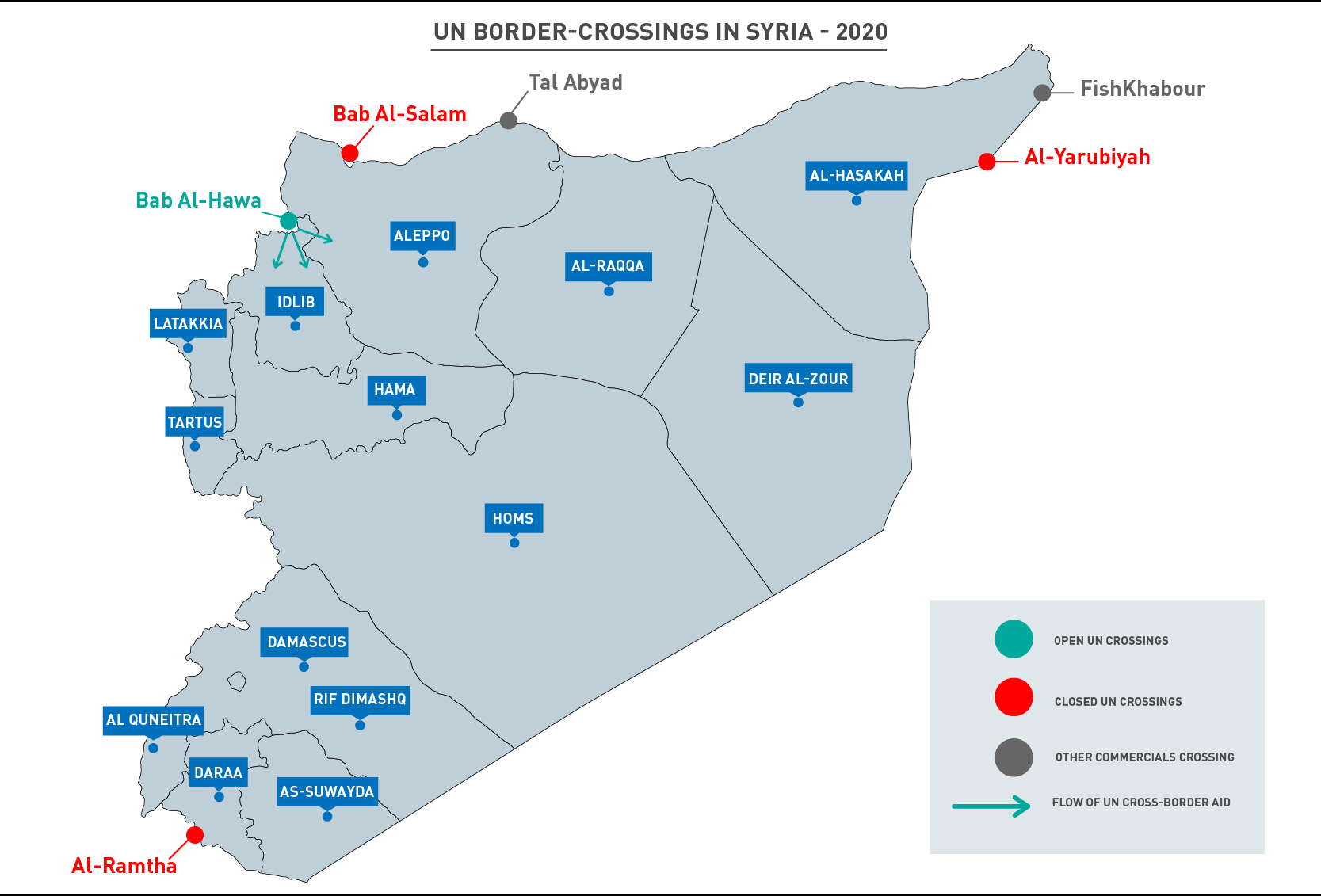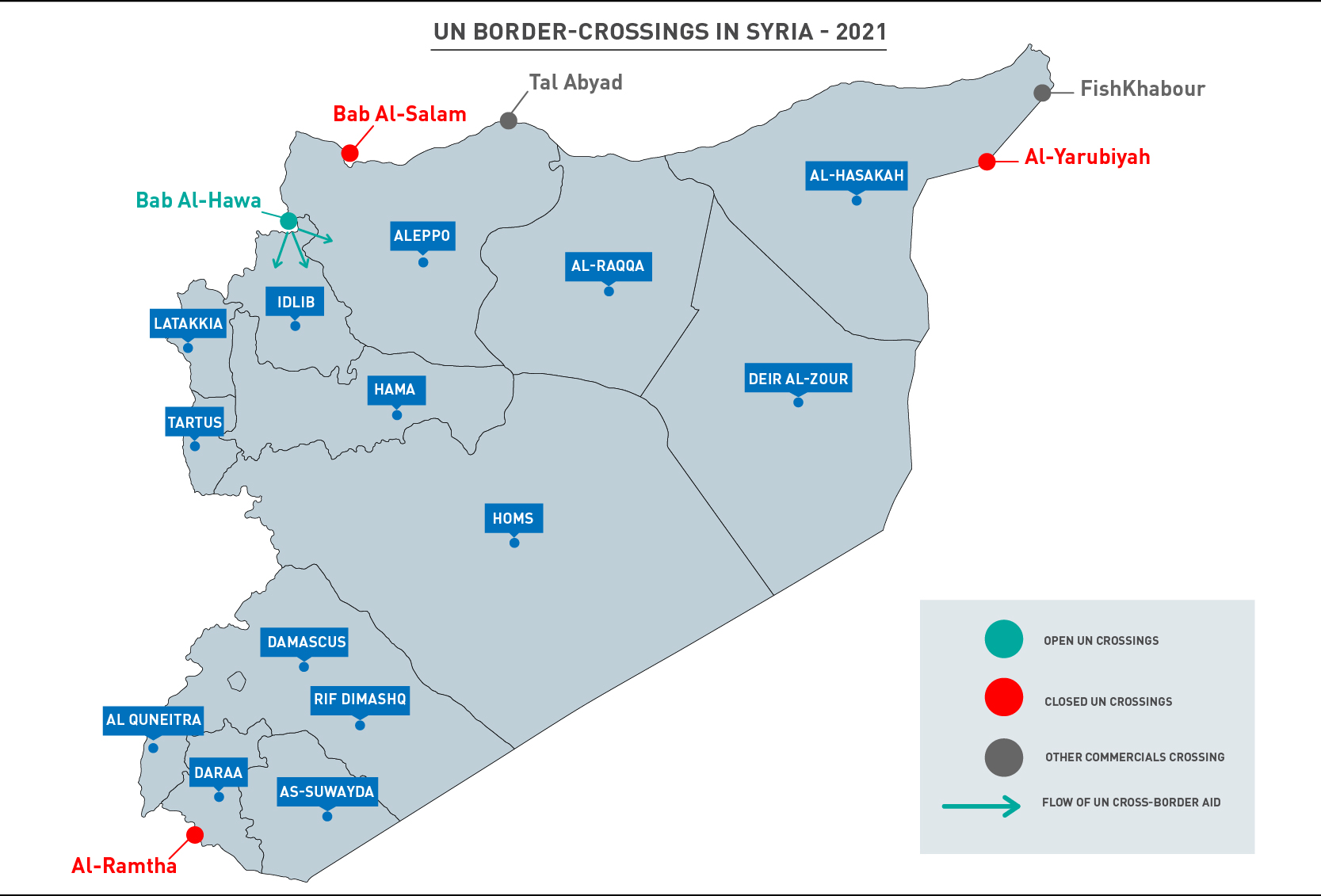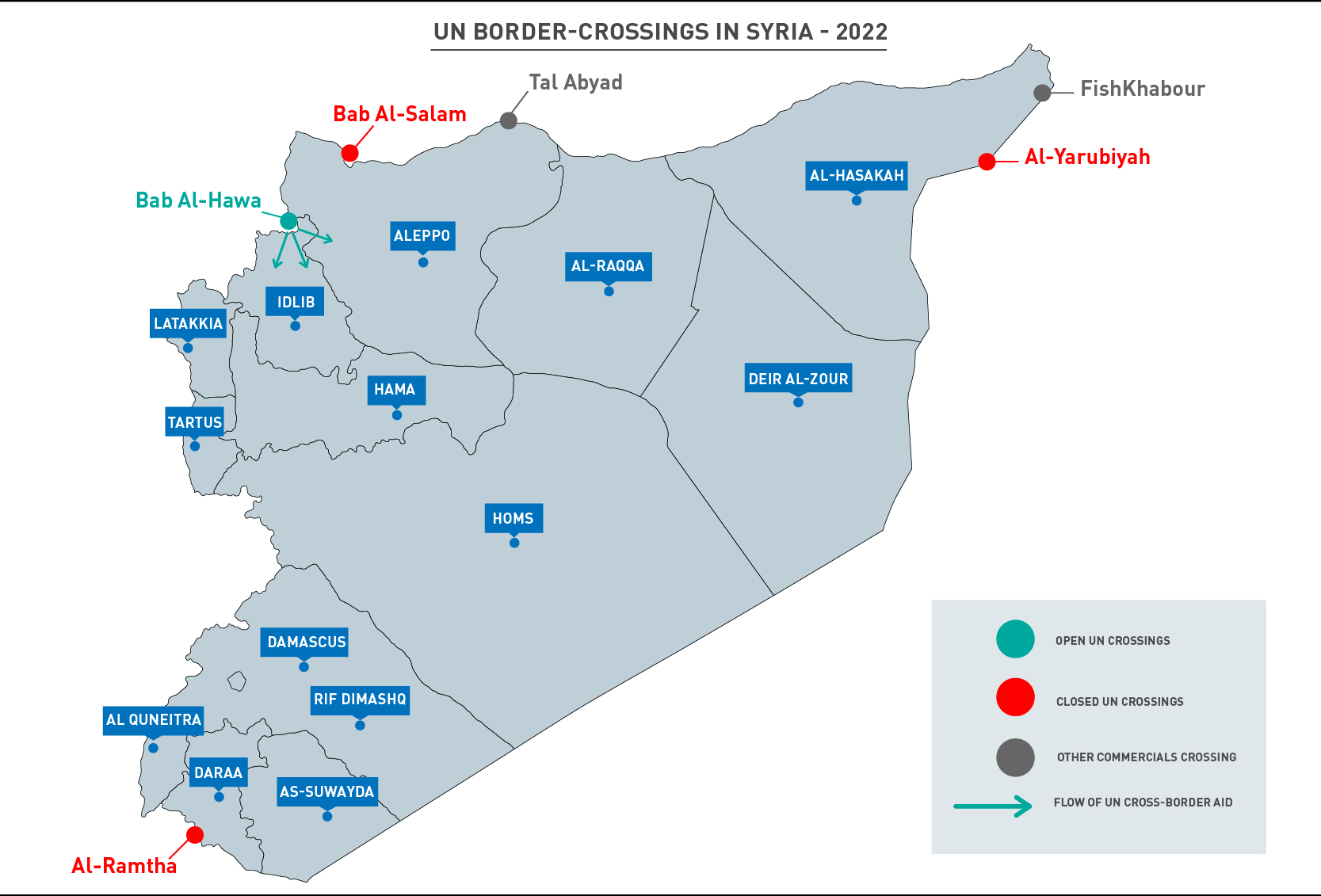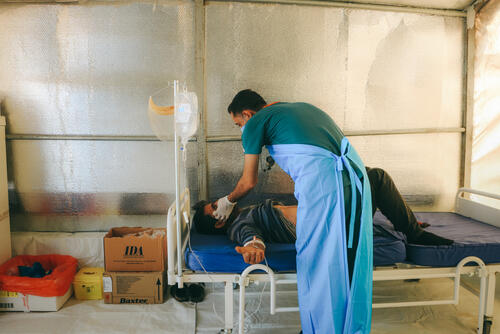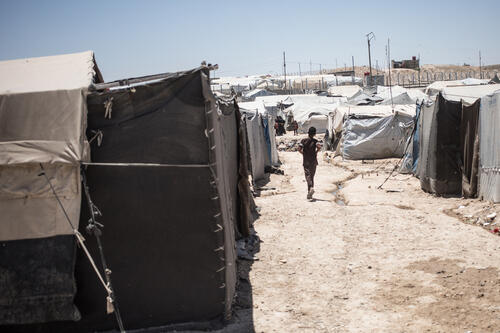Out of 4.4 million people living in northwest Syria, 4.1 million need humanitarian aid. More than 60 per cent are internally displaced people (IDPs). They will soon lose access to desperately needed humanitarian and medical aid, unless the UN cross-border resolution (UNSCR 2585) is renewed by the UN Security Council by 10 July 2022.
Cross-border points remain the only viable humanitarian channels to cover growing needs in northwest Syria. Since 2014, 47.7 million peoplehttps://reliefweb.int/report/syrian-arab-republic/syrian-arab-republic-united-nations-cross-border-operations-under-unsc-resolutions-31-may-2022 have received healthcare assistance because of the cross-border channel (OCHA).
Médecins Sans Frontières (MSF) calls on the United Nations Security Council (UNSC) to renew the cross-border resolution, which expires on 10 July 2022, for the provision of humanitarian aid through the Bab Al-Hawa crossing point into northwest Syria.
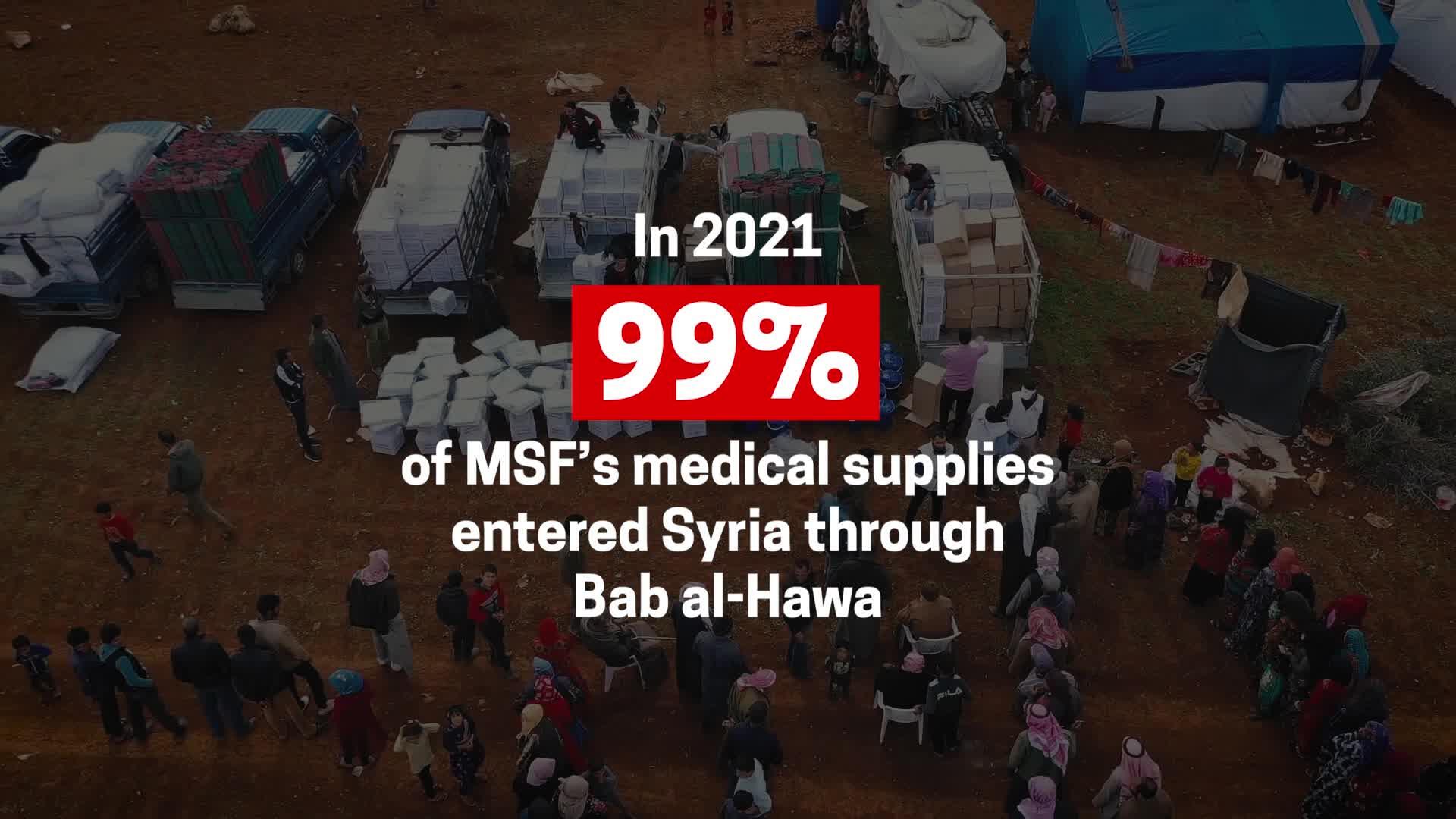
Bab Al Hawa crossing must stay open
Growing humanitarian needs
In northwest Syria, the economic crisis and COVID-19 have compounded the dire humanitarian situation caused by 11 years of war, with greater numbers of people than ever in desperate need of assistancehttps://reliefweb.int/report/syrian-arab-republic/northwest-syria-factsheet-16-june-2022.
- 4.1 million people in need in northwest Syria
- 3.1 million people need healthcare assistance
- 3.1 million people are food insecure
- 2.8 million internally displaced people (80 per cent women and children)
What is the cross-border resolution?
If the cross-border resolution is not renewed...
Failure to renew the cross-border resolution would drastically disrupt and reduce the delivery of humanitarian and medical aid in northwest Syria and would further aggravate the already precarious humanitarian situation.
“If the medical supply stops, people risk losing access to healthcare. If this lifeline is cut off, people’s access to basic food, water and healthcare will be drastically reduced. This will lead to preventable deaths,” says Claire San Filippo, MSF head of mission in Syria.
If this lifeline is cut off, people’s access to basic food, water and healthcare will be drastically reduced. This will lead to preventable deaths.Claire San Filippo, MSF head of mission in Syria.
Most hospitals and health facilities will lack the medical supplies needed to operate, and patients’ health and lives will be at risk.
“MSF will be forced to revise the scale and quality of health support provided in northwest Syria and will no longer be able to provide the current volume of response reaching the most vulnerable people,” says San Filippo.
Our humanitarian and medical response was made possible through the cross-border resolution that ensures the availability of vital medical aid into the country.
Our teams have been present in Syria since 2011, but since late 2020, we have become increasingly reliant on World Health Organization (WHO) convoys, crossing into northwest Syria through the humanitarian corridor at Bab Al-Hawa, to transport our essential medical aid into the area.
Humanitarian aid supplied by MSF to northwest Syria
Since 2016, we have shipped 8,418 cubic metres (equivalent of filling nearly 3.5 Olympic-sized swimming pools) of humanitarian aid into northwest Syria, both through humanitarian and commercial channels.
To address the medical needs in Idlib and Aleppo governorates, where the healthcare system remains very fragile, MSF supports:
- Seven hospitals, including one specialised burns unit
- Twelve basic healthcare centres, such as clinics and health posts
- Eleven mobile clinics
- Water, sanitation and hygiene needs in 100 camps
- Community-based surveillance for diseases in 40 camps
In 2021, across all of our projects in northwest and northeast Syria, we provided:
1,144,500
1,144,5
130,200
130,2
60,300
60,3
43,900
43,9
12,200
12,2
18,100
18,1
Why does Bab Al-Hawa remain the most important cross-border?
Sending aid through the Bab Al-Hawa crossing point remains the fastest, most effective, transparent and least expensive way for humanitarian aid to cross into northwest Syria.
It is difficult for MSF to use other commercial channels because:
- Some medical items, such as vaccines and tuberculosis medications or psychotropic medications, are not always available or subject to challenging custom restrictions.
- Ensuring adequate quality standards, particularly for medical items and drugs inside northwest Syria, is challenging. Some medicines are simply not available in the area.
Funding will decrease, so will the volume of humanitarian aid:
- Most international and local humanitarian groups operating in the northwest of Syria rely on pooled funds channelled through UN mechanisms linked to the cross-border resolution currently in place. If the resolution is not renewed, these groups will have to work on shaky ground and would need a lot of time to readjust to a new reality.
People who received healthcare through cross-border channel
Graph showing the evolution of the number of people who received healthcare services because of the cross-border channel since July 2014 which amounts to a total of 47.7 million people. Source: OCHA
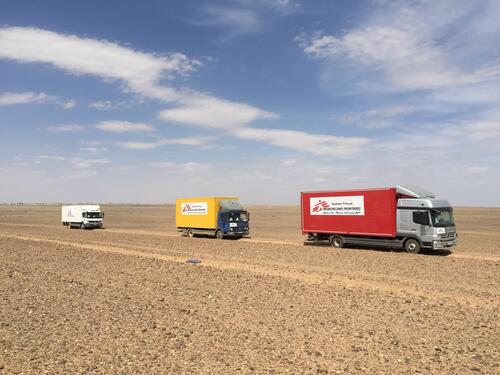
Why can’t crossline replace cross-border?
In 2021, crossline operations were introduced as an alternative mechanism to bring humanitarian aid from government-controlled areas into northwest Syria. As of June 2022, only five crossline humanitarian aid convoys have reached northwest Syria from government-controlled areas.
| Cross-border (from Turkey to Syria) | Crossline |
|---|---|
| Cross-border (from Turkey to Syria) 51,717 trucks since July 2014 |
Crossline 5 convoys (71 trucks) since July 2021 |
| Cross-border (from Turkey to Syria) 2.4 million people reached each month |
Crossline 40,000 people reached each month |
The crossline mechanism has faced substantial limitations throughout the conflict, including, but not limited to:
- Approval delays and limitations imposed by the Government of Syria
- Lasting disagreements between warring parties on the ground
- Absence of independent monitoring mechanisms
- Lack of acceptance of crossline groups and activities by local communities in areas that are not under government control.
Subsequently, crossline can under no circumstances substitute cross-border operationshttps://reliefweb.int/report/syrian-arab-republic/syrian-arab-republic-united-nations-cross-border-operations-under-unsc-resolutions-31-may-2022.
Based on the above, MSF calls on the United Nations Security Council (UNSC) to renew the cross-border resolution (2585) expiring on 10 July 2022 for the provision of humanitarian aid through Bab Al-Hawa crossing point into northwest Syria.
For more information on the necessary renewal of the UN cross-border resolution for Syria, click to download the briefing paper below.



